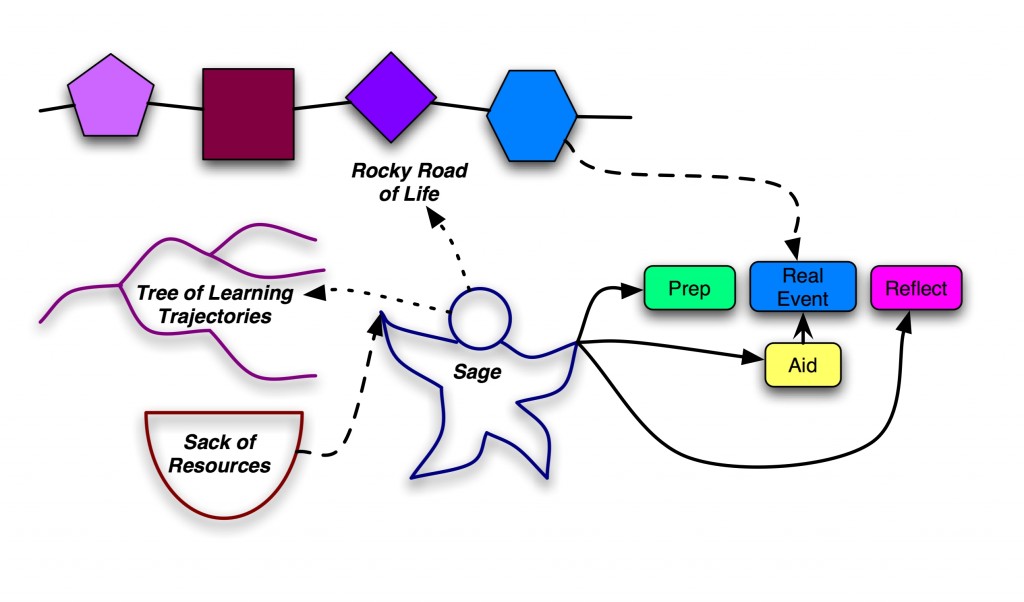A number of years ago, I wrote an article (PDF) talking about how we might go beyond our current ‘apart’ learning experiences. The notion is what I call ‘layered learning’, where we don’t send you away from your life to go attend a learning event, but instead layer it around the events in your life. This is very much part of what I’ve been calling slow learning, and a recent conversation has catalyzed and crystalized that thought.

Think about the sort of ideal learning experience you might have. As you traverse the ‘rocky road’ of life, imagine having a personal coach who would observe the situation, understand the context of the task and the desired goal, and could provide some aid (from some sack of resources) that could assist you in immediate performance. Your performance would improve.
Let’s go further. This sage, moreover, could draw from some curricula (learning trajectories) and prepare you beforehand and guide reflection afterward so that real performance event now becomes a learning opportunity as well, helping you understand why this particular approach makes sense, how to adapt it, and more. In this way, the sage moves from performance coach to learning mentor.
One step further would be to have learning trajectories not only about the domain (e.g. engineering) but also about quality, management, learning, and more. So learners could be developed as learners, and as persons, not just as performers.
Now this would be ideal, but individual mentors don’t scale very well. But here’s the twist: we can build this. We can have curricula, learning objects, and build a sage via rules that can do this. Imagine going through your workday with a device (e.g. an app phone or a small tablet) that knows what you’re doing (from your calendar), which triggers content to be served up before, during, and after tasks, that develops you over time. We can build the tutor, develop and access the curricula and content, deliver it, track it.
I hope this is clear. There are other ways to think about this, and I’ll see if I can’t capture them in some way; stay tuned. The limitations are no longer the technology, the limits are between our ears. Reckon?
This fits well with our cascading model of ementoring. Will quote your ideas and subscribe for more ideas for harvesting.
I believe their is a new mobile device already available for this.
I reckon.
…sage- ementor- personal tutor- aura guide- An organic/growing predictive input/output data interpreter that utilizes personal information from numerous sources such as individual response, expression, personal networks,and other sources…..to construct individual learning scenarios full of just in time inspirations and motivators for obtaining OPTIMUM WISDOM and prosperity of life
http://blogs.ubc.ca/egan/2011/08/12/the-sage-on-the-side/
:)
I believe that this model was best developed and illustrated in Neal Stephenson’s The Diamond Age: a young girls illustrated primer- first published, I believe, in 1995. The novel traces 3 girls who have the primer through life. the device supported by a mentor did have a cost.
In practice, the competency based degree program of Western Governors University operates in a similar manner but only until one gets a diploma or as long as one pays about USD 6K/year for mentor support.
There are other models of a similar nature emerging in practice
Tom, I hadn’t recalled that Stephenson’s book was as context aware as I’m talking about, so I opened my copy (a replacement not quite as worn as my original, which was probably lent and not returned). It is somewhat context aware, but customizes a story based up on the person, but only with limited relation to the ongoing events in life. I’m not talking about learning ‘apart’ here, where you go into the book and learn, but instead where your world is augmented not only with information, but with learning support. I love Stephenson’s vision, but this is a light twist on that. I like WGU’s competency program (tho’ of course I worry about the focus being a bit more knowledge than skill focused, and the lack of social interaction is, to me, not as optimal (with the caveat that I haven’t done a deep look at them for a number of years now).